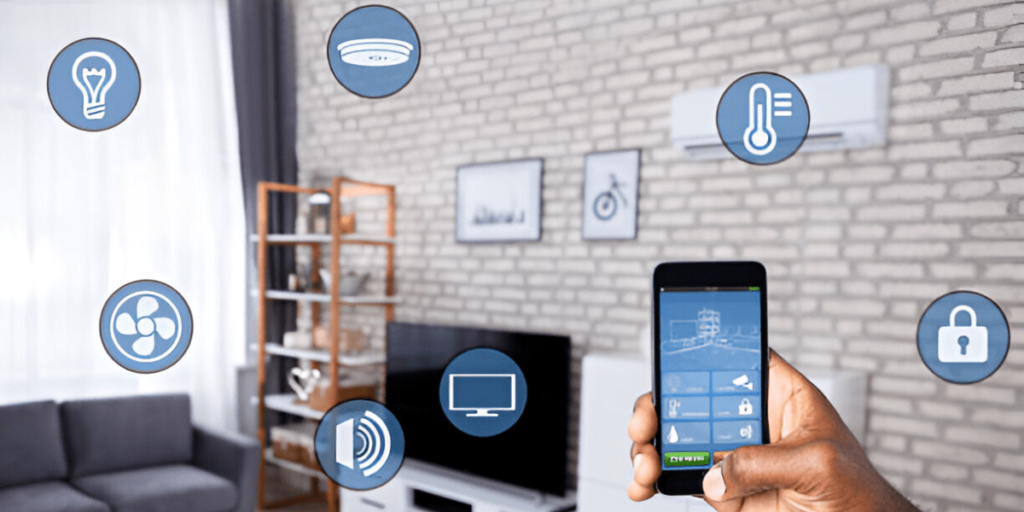
Her favorite Ed Sheeran song fills the room as soon as she steps in from a long day at work, instantly soothing her. Meanwhile, another person appreciates how their home knows when to dim the lights for movie night. A push notification alerts someone else that the garage door has been left open, but there is no need to worry because their smart system automatically secures it.
These examples illustrate how smart home technology is becoming vital as more people opt for it. These advancements are revolutionizing daily living. Let’s have a look.
What is a Smart Home?
A smart home is a residence equipped with interconnected devices that can be controlled remotely via smartphones, tablets, or other internet-enabled devices. These devices communicate using technologies like Wi-Fi and Bluetooth, enabling homeowners to control and automate various household functions. From lighting and climate control to security systems and entertainment, smart homes offer a seamless and efficient living experience.
How Do Smart Homes Work?
Modern smart homes operate through a central hub or a series of interconnected devices that collect and share data. These devices have sensors and actuators that can detect environmental changes and respond accordingly. For instance, a smart thermostat can adapt to a homeowner’s schedule and adjust the temperature according to their preferences. In contrast, smart lighting systems can be set to turn on or off at designated times or in reaction to movement. Integrating artificial intelligence and machine learning further enhances the capabilities of smart home systems, enabling them to adapt and learn from user behavior over time.
The Impact of Smart Home Automation
Customized Ambiance with Smart Home Technology
Smart technology offers the ability to create a personalized ambiance, tailoring lighting, temperature, and music to individual preferences.
⦁ Smart lighting systems: Adjust brightness and color based on time of day or activity, creating a comfortable atmosphere.
⦁ Smart thermostats: Learn schedules and adjust temperatures for optimal comfort.
⦁ Integrated music control: Plays favorite tunes to suit any mood or occasion.
Advanced Security and Safety Features
Smart home automation significantly enhances a residence’s security and safety. Advanced security systems equipped with cameras, motion sensors, and door/window sensors can detect and alert homeowners of unusual activity. Remote monitoring capabilities allow homeowners to keep an eye on their property from anywhere in the world, providing peace of mind and a sense of security. Additionally, smart locks can be controlled remotely, allowing homeowners to grant access to trusted individuals even when they are not home.
Remote Monitoring and Control
Monitoring and controlling various aspects of a home remotely is one of the key advantages of smart home technology. Homeowners can use their smartphones or tablets to check the status of their devices, receive alerts, and make adjustments as needed. This level of control ensures that homes are always running efficiently and that any potential issues can be addressed promptly. For example, a homeowner can receive a notification if a door is left open or if there is a water leak, allowing them to take immediate action.
Health and Wellness Assistance
Smart home technology is also essential in enhancing health and wellness. Devices such as smart air purifiers, humidifiers, and sleep trackers can monitor and improve indoor air quality, humidity levels, and sleep patterns. Modern smart homes can also integrate with fitness devices and health apps to provide comprehensive health and wellness insights. This holistic approach to health management ensures that homeowners can maintain a healthy and comfortable living environment.
Entertainment with Smart Home Systems
Entertainment is another area where smart home automation excels. Homeowners can create immersive entertainment experiences by integrating their audio and video systems with smart home automation. Smart speakers, TVs, and streaming devices can be controlled through voice commands or mobile apps, allowing easy access to music, movies, and other forms of entertainment.
Convenient Home Automation with Smart Devices
Smart home automation simplifies daily routines and tasks, making life more convenient and efficient. Homeowners can automate various functions, such as turning on lights, adjusting the thermostat, and opening or closing curtains. These automated processes save time and effort, allowing homeowners to focus on more important activities. Voice-activated assistants like Amazon Alexa and Google Assistant further enhance convenience by providing hands-free control over smart home devices.
Optimized Energy Efficiency
Smart home technology greatly improves energy efficiency by optimizing the use of thermostats, lighting systems, and appliances.
⦁ Smart thermostats: Modify temperatures according to occupancy patterns, cutting down on energy use when the home is empty.
⦁ Smart lighting systems: Set to turn off automatically when rooms are unoccupied, helping to conserve energy.
⦁ Energy-efficient appliances: Learn and adapt to homeowner preferences for optimal energy usage.
Final Thoughts
As smart home technology continues to evolve, a Home Automation Company in Pakistan, Konke, is at the forefront of providing innovative home automation solutions. Our comprehensive range of smart apartment automation devices and services ensures that homeowners can enjoy the benefits of a connected and intelligent living environment. By embracing smart home automation, homeowners can enhance their comfort, security, and efficiency, transforming their daily lives in remarkable ways

